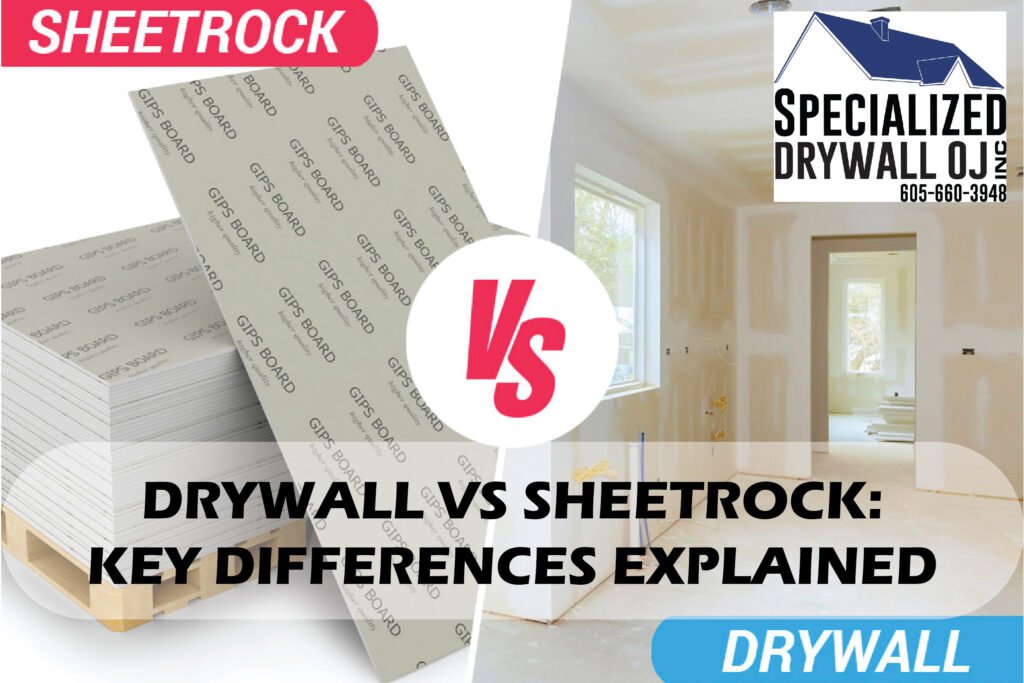If you’ve ever tackled a renovation or new home build, chances are you’ve come across the terms drywall and Sheetrock. Many homeowners, DIYers, and even some contractors use the terms interchangeably—but are they the same thing? And if not, which one should you choose for your next project?
Let’s clear the confusion once and for all. This guide breaks down the difference between Sheetrock and drywall, compares their benefits, and helps you decide which works best for your needs. Whether dealing with moisture-prone areas, prioritizing fire resistance, or just looking for smoother finishes, we’ve got you covered.
Let’s dive into the Sheetrock vs drywall debate and settle it with facts.

What Is Drywall?
Drywall is a construction material made of gypsum (a soft sulfate mineral) sandwiched between two thick sheets of paper. It’s used to create walls and ceilings in nearly every modern home. Drywall comes in standard, moisture-resistant, fire-resistant, and soundproof versions.
It’s affordable, easy to install, and widely available. Contractors love it because it cuts installation time in half compared to traditional plaster.
Fun Fact: The term “drywall” is generic—much like saying “soda” instead of calling out Coke or Pepsi.
What Is Sheetrock?
Now, here’s where the branding kicks in. Sheetrock is a brand name for drywall, manufactured exclusively by USG (United States Gypsum Corporation). Think of it this way: all Sheetrock is drywall.
The brand drywall is known for its high-quality formulations, smoother finishes, and durability. Many contractors prefer it because it’s trusted, performs consistently, and offers specialized versions like fire- and moisture-resistant boards.
So, to answer the common question: Is Sheetrock drywall? Yes. It’s just a premium version of it.
Sheetrock vs Drywall: Side-by-Side Comparison
Let’s break down the Sheetrock drywall comparison to see what sets them apart.
| Feature | Drywall | Sheetrock (by USG) |
| Generic or Branded? | Generic | Branded |
| Cost | Slightly lower | Slightly higher |
| Performance Consistency | Varies by brand | High and consistent |
| Special Features | Depends on the brand | Includes mold, moisture, & fire resistance |
| Durability | Good | Excellent |
| Finish Quality | Average to Good | Smooth, premium finish |
When choosing between the two, remember: it’s not just about cost—it’s about value. Sheetrock’s benefits over drywall often outweigh the slight bump in price.
Explore Sheetrock services here: Sheetrock Services
Sheetrock Installation vs Drywall Installation
When it comes to installation, both materials follow the same basic process: measuring, cutting, screwing into place, and taping/mudding the seams.
However, Sheetrock installation vs drywall installation differs slightly in performance. Sheetrock boards tend to be more resistant to edge crumbling, which makes them easier and cleaner to cut. This results in less waste and faster application—especially on large projects.
Also, professional installers often prefer Sheetrock because it produces a smoother finish that requires less sanding.
Fire Resistance: Sheetrock vs Drywall
Fire safety is a huge concern for any homeowner. Both drywall and Sheetrock offer fire-resistant options, but Sheetrock often comes out on top.
USG manufactures specialized products like Type X and Type C Sheetrock, which are designed for high fire resistance. These boards include glass fibers within the gypsum core, making them better suited for areas where fire-rated assemblies are required—like garages or shared walls in apartment buildings.
If you’re weighing fire-resistant Sheetrock vs drywall, go with Sheetrock if peace of mind is your priority.
Moisture Resistance: Which Holds Up Better?
You’ll want materials that can handle humidity in areas like bathrooms, basements, or kitchens. Moisture-resistant drywall vs Sheetrock shows some key differences.
While both offer moisture-resistant options (often referred to as “green board” or “purple board”), Sheetrock’s Mold Tough® or Humitek® lines are top-tier. They’re designed to resist mold growth and repel moisture far better than standard drywall.
If you’re battling mold or moisture-prone spaces, check this helpful repair guide: Blog
Longevity and Strength: Which One Lasts Longer?
This is where Sheetrock’s benefits over drywall shine. Sheetrock boards are built to withstand more impact and stress without cracking or crumbling. They’re ideal for high-traffic areas like hallways, living rooms, or commercial spaces.
Over time, standard drywall might chip or show signs of wear, especially with kids, pets, or frequent remodeling. In contrast, Sheetrock keeps its integrity better under long-term use.
Which Should You Choose?
If the budget is tight and you’re working on a basic remodel, generic drywall will probably do. But if you’re going for high durability, fire or moisture resistance, and a premium finish, Sheetrock is the smarter investment.
It’s not a battle between evil vs good—it’s evil vs better.
Pro tip: Hire pros like Specialized Drywall OJ Inc. to ensure professional installation with flawless results.
Final Thoughts
Choosing between drywall and Sheetrock doesn’t have to be complicated. While they serve the same primary purpose, their differences in quality, performance, and special features can impact your project’s outcome significantly.
So next time you’re standing in the aisle trying to decide what to buy—remember this guide, and you’ll never go wrong.
FAQs
1. Is there a big difference between Sheetrock and regular drywall?
Yes—while both are essentially the same material, Sheetrock is a branded product known for consistent quality and added features.
2. Which is cheaper, Sheetrock or drywall?
Generic drywall is usually cheaper, but Sheetrock offers better value in the long run due to durability and performance.
3. Is Sheetrock more fire-resistant than drywall?
Yes. Sheetrock’s fire-rated products, like Type X, are designed for better fire protection.
4. Can I install Sheetrock myself?
Absolutely. If you’ve installed drywall before, the process is the same. Just be ready for better handling and finish.
5. Is Sheetrock better in humid environments?
Products like Mold Tough® Sheetrock are ideal for high-moisture spaces like bathrooms or basements.

